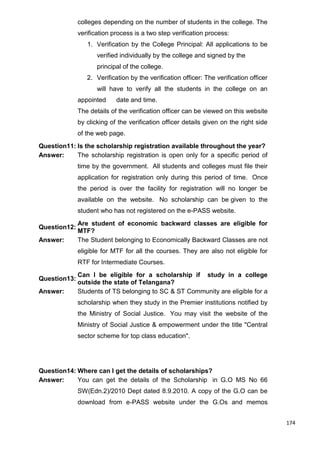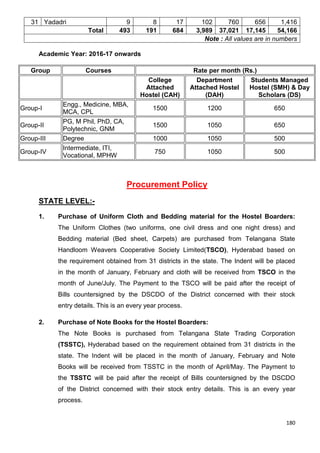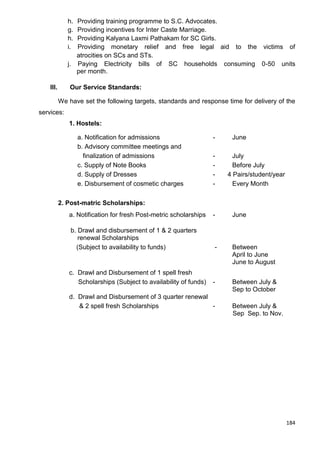1) The Scheduled Caste Development Department aims to develop Scheduled Castes socially, educationally and economically to achieve an egalitarian society.
2) The department operates 675 hostels across Telangana that provide free boarding, lodging, textbooks and other materials to over 55,000 students.
3) Special hostels have been set up in each district to provide extra tutoring in key subjects to improve academic performance for students in classes 9 and 10.
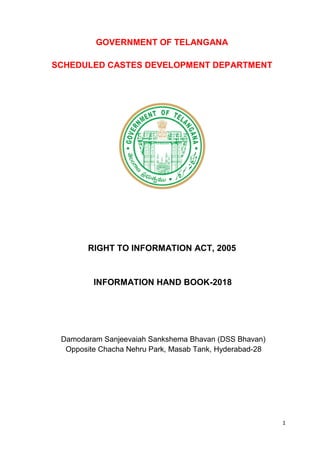
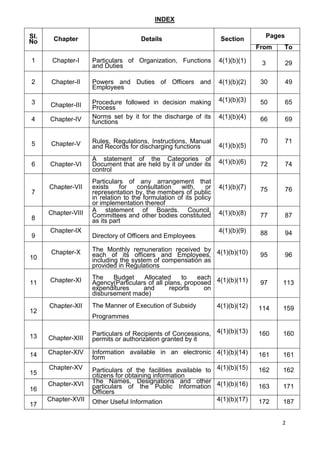
![3
CHAPTER–1
PARTICULARS OF ORGANIZATION, FUNCTIONS AND DUTIES
[Section (1) (b) (1)]
INTRODUCTION
BACKGROUND
The Right to information Act.2005 No.22 of 2005 received the assent of the
President of India on the 15thJune 2005. The Act is to provide for setting out the
practical regime of Right to Information for citizens to secure access to information
under the control of Public Authorities, in order to promote transparency and
accountability in the working of every public authority, the Constitution of a Central
Information Commission and State Information Commissions for matters connected
there which are incidental thereto. The Act extends to the whole of India except the
State of Jammu & Kashmir.
OBJECTIVE OF INFORMATION HANDBOOK
Under Section 4 (1) (b) of the RTI Act 2005, casts an obligation on every Public
Authority to publish information on 17 Manuals referred to their in within the expiry of
120 days, from the date of enactment of the Act. Under Section 5(1),(2) of the Act.,
every Public Authority shall within 100days of the enactment, Designate Officers as
Public Information Officers and Assistant Public Information Officers. To comply with
the provisions of the Act, this Information Hand Book is published for the use of public.
This Hand Book gives a good knowledge of functioning of Scheduled Caste
Development (Here-after to be read as SCD) Department of Telangana State with its
schemes, Rules and functioning style.
a. VISION of the Organization
“To bring the Scheduled Castes socially, educationally and economically on
par with other developed communities and to achieve an egalitarian society”.
b. MISSION of the ORGANIZATION
“The mission of the department is to ensure better opportunities for the poor
people belonging to Scheduled Castes to utilize educational facilitates, to eradicate
poverty and eliminate current inequalities that prevent the Scheduled Castes from
realizing their full potential and thus establishing an egalitarian society”.](https://image.slidesharecdn.com/scdd-rtimanual-221009060943-51d350de/85/SCDD-RTIManual-pdf-3-320.jpg)



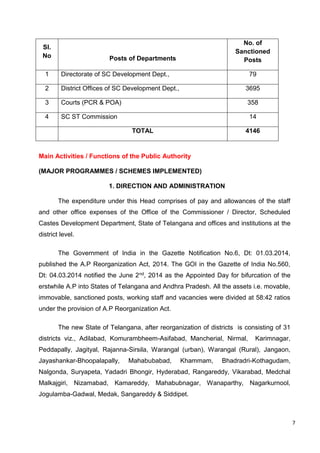
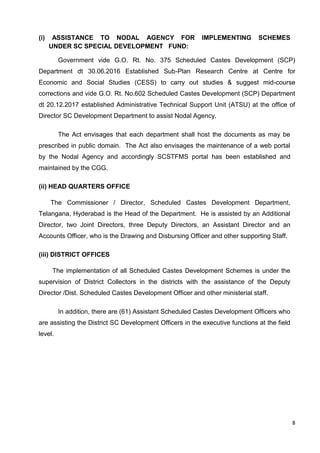

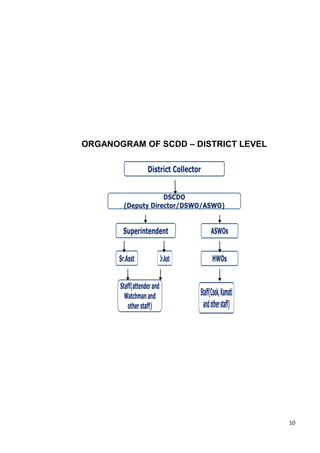






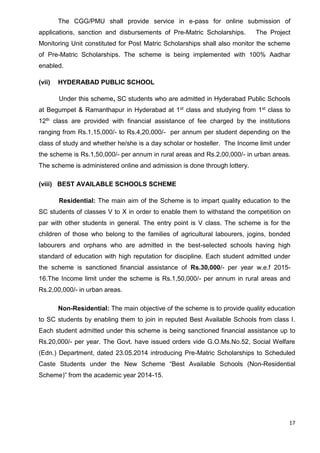


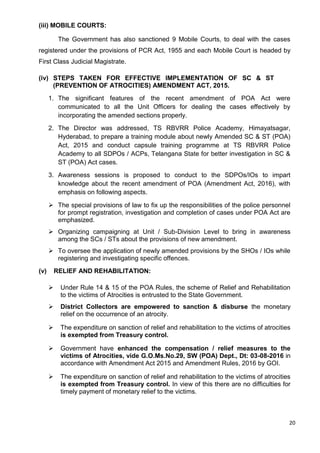


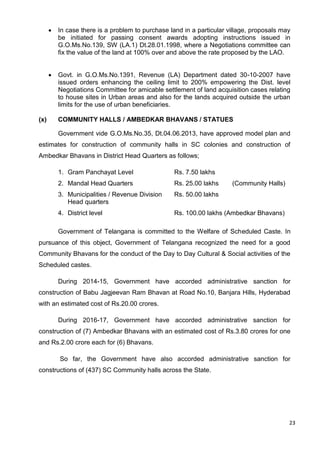

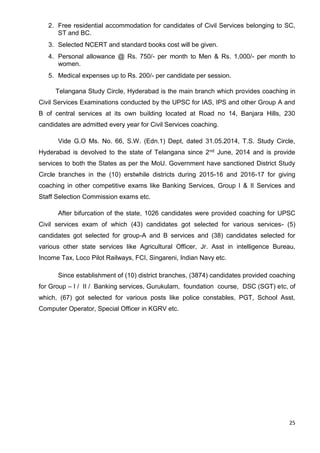
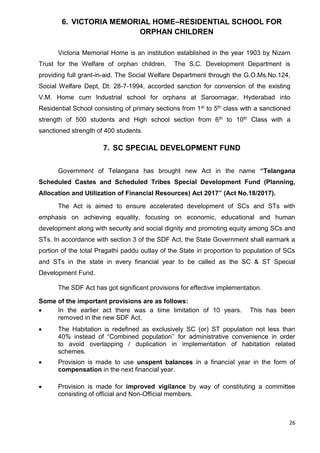



![30
CHAPTER–2
POWERS AND DUTIES OF OFFICERS AND EMPLOYEES
[Section 4(1) (b) (2)]
Designation: Director/Commissioner
Powers:
The duties and responsibilities of each functionary in terms of financial
administrative, developmental etc., are generally fixed by Government keeping in view the
various objectives, roles of the Department in the public interest for welfare of specific
groups. It may be difficult to classify the functions of each staff member into water tight
compartments as this type of classification leads to overlapping. But however, this type of
broad classification is also necessary for efficient discharge of duties, responsibilities.
Feedback from field situation of various aspects at development is quite essential
for purpose of monitoring and to evolve efficient system to deliver the benefits to target
groups.
a) Administrative:
The Director of SCDD is the appointing authority for the posts of Superintendent,
A.S.W.O, D.S.W.O., Asst. Editor and Publicity Assistant as per the provisions of the
Ministerial Services Rules and G.O. Ms. No 188 & I89SW (A2) Dept., dt. 31.12.1997.
He Initiates disciplinary action on all the subordinate officers including the staff in
the districts for administrative lapses dereliction of duties, corruption cases under
relevant provisions under T.S Civil Services (Classification, Control and Appeal) Rules.
1991.
Competent authority for suspension of Superintendents, ASWOs and D.S.W.Os and
all other posts / staff appointed by him as per provisions of G.O. Ms. Nos. 188 &189. SW
(A2) Dept. dt. 31.12.1997 in the entire State.
Appellate authority in respect of Hostel Welfare Officers and other non gazetted staff
in the entire state under the provisions of Rule 34 of AP Civil Services (CCA) Rules 1991.
He is the pension sanctioning authority to all the Gazetted officers of the Department
and other staff of the Directorate.](https://image.slidesharecdn.com/scdd-rtimanual-221009060943-51d350de/85/SCDD-RTIManual-pdf-30-320.jpg)





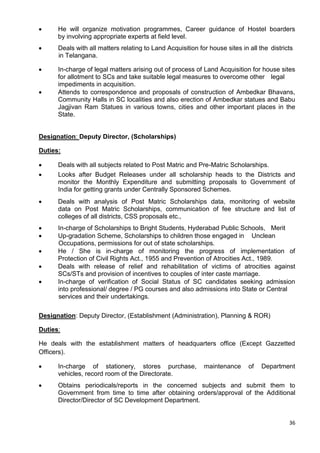
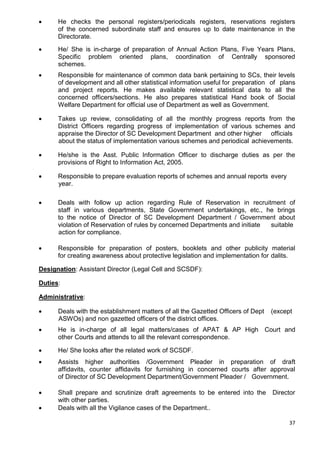



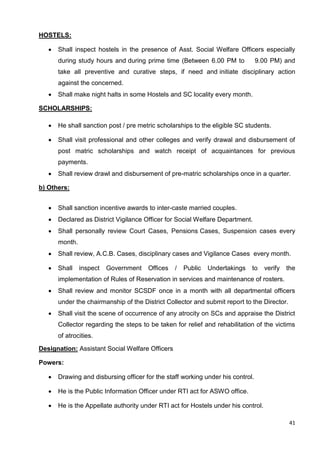







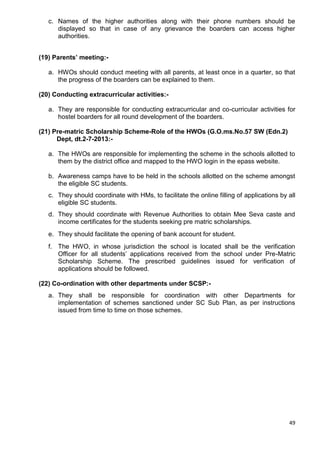
![50
CHAPTER – 3
PROCEDURE FOLLOWED IN DECISION MAKING PROCESS
[Section 4(1) (b) (3)]
PROCEDURE FOLLOWED IN THE DECISION MAKING PROCESS, INCLUDING
CHANNELS OF SUPERVISION AND ACCOUNTABILITY
Head Quarters – Director of SC Development Department
Decision making and Channels of Supervision:-
The currents are received in the office in Inward Section. Each new current will be
assigned a number and handed over in the concerned section. The Junior Assistant /
Senior Assistant of the section will put up the file along with rule position to the
Superintendent. The Superintendent submits the files to the Dy. Director / Joint Director /
Additional Director. The Joint Director/Additional Director (SCDD) will submit the file to
the Director of SCDD. The Director of SCDD will take a decision on the matters related to
Budget, Policy and Service matters. The Joint Director / Addl. Director (SCDD) will take
decision on routine matters.
Accountability:
All the Officers of SC Development Department have to follow the Rules set by
the Government and responsible for implementation of the schemes.](https://image.slidesharecdn.com/scdd-rtimanual-221009060943-51d350de/85/SCDD-RTIManual-pdf-50-320.jpg)


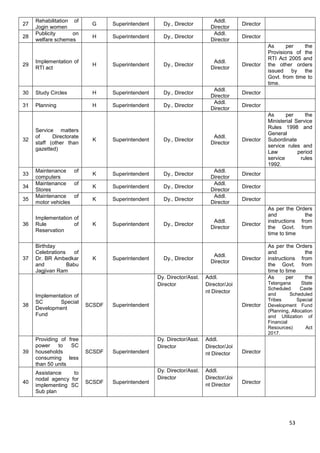


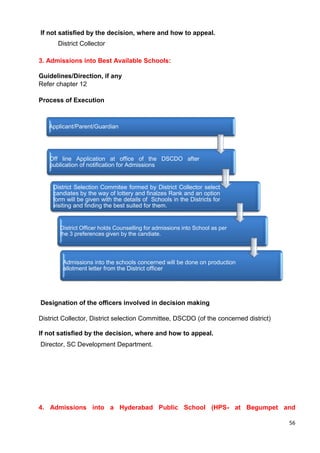




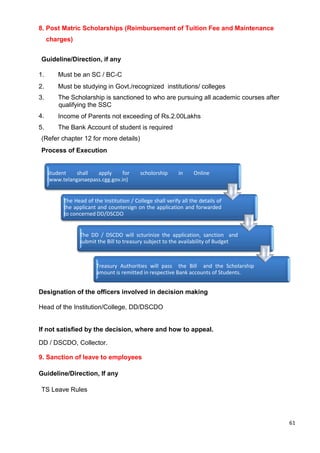




![66
CHAPTER – 4
NORMS SET BY IT FOR THE DISCHARGE OF ITS FUNCTIONS
[Section 4(1) (b) (4)]
SC Development Department has set the following targets, standards and
response time for delivery of the services:
1. Hostels
1 Notification for admissions June
2 Advisory committee meetings and
finalisation of admissions
July
3 Supply of Note Books Before July
4 Supply of Dresses Each 4 Pairs
5 Disbursement of cosmetic charges Every Month
2. Post-Matric Scholarships:
1 Notification for fresh Post-metric
Scholarships
June
2 Drawl and disbursement of 1 & 2 quarters
Renewal Scholarships (Subject to
availability of funds)
Between April to
June
3 Convening of Scholarships committee
meeting and sanction of fresh Scholarships
by June
4 Drawl and Disbursement of 1 spell fresh
Scholarships (Subject to availability of funds)
Between July and
September
5 Drawl and Disbursement of 3 quarter renewal
& 2 spell fresh Scholarships
Between July &
Sep
3. Ambedkar Overseas Vidya Nidhi Financial Assistance
1 Notification for fresh Overseas Scholarships June/July and
January/February
2 Interviews with the applied Candidates Feb/March & Aug /Sep.
3 Advisory committee meetings and finalisation
of Scholarships
April & October
4 Drawl and disbursement of 1st Instalment
(Rs.10 Lakhs) (Subject to availability to funds)
After Landing Permit /
I-94 (immigration Card)
5 Drawl and disbursement of 2nd Instalment
(Rs.10 Lakhs) (Subject to availability to funds)
After Production of 1st
Semester Results
4. Coaching to SC students appearing for various Competitive Examinations](https://image.slidesharecdn.com/scdd-rtimanual-221009060943-51d350de/85/SCDD-RTIManual-pdf-66-320.jpg)



![70
CHAPTER-5
RULES, REGULATIONS, INSTRUCTIONS, MANUAL AND RECORDS
FOR DISCHARGING FUNCTIONS
[Section 4 (1) (b) (5)]
The following Rules and Manuals prescribed by the Government are followed by
the Employees in discharging their duties and functions
Sl.
No.
Name / Title of the
Document
Type of
the
Document
Details in Brief
1 The District Office Manual
http/www.apct.Gov.iryapportal/
others/Distofficemannual.pdf
Manual This was introduced in all the HODs and
district offices vide G.O.Ms. No. 1825 G.A.
(O & M) Dept. dt: 26-12-1959. It mainly
deals with the general procedures and
systems to be followed for conducting
routine work in Govt. Offices
2 The Fundamental Rules Rules These rules came into force with effect
from 1-1-1992 and apply to all Govt.
servants paid from the consolidated fund of
the State. It deals with Statutory rules
regarding recruitment and regulates the
pay and allowances and probation,
increments, leaves, transfers etc.
3 The TS CS (CCA) Rules 1991 Rules These rules came into effect from 1-10-
1992 and apply to all State Govt.
employees. This rules deals with
suspensions, penalties, appeals etc,.
4 TS State and Sub-ordinate
service rules 1996
Rules This rules apply to all State and sub
ordinate services and deals with the
procedures to be followed with regard to
appointments, promotions confirmations,
probations, seniority etc,. of the employees
5 The Conduct Rules 1964 Rules These rules are framed to regulate the
conduct of the Govt. servant to see the
interest of the Govt. as well as to safeguard
the interest of the public and also to
observe certain standards in dealing with
public also in their private life
6 Ministerial Service rules Rules These rules relate to service matters such
as unit and method of appointment,
promotions of all the ministerial staff like
typists, Junior Assistants, Senior
Assistants, Superintendents etc,.
7 General sub ordinate service
rules
Rules These rules applicable to the posts of
record assistants, lift operators, shroffs,
Xerox operators, drivers and deals with
their service matters
8 Revised pension rules 1980 Rules These rules govern the sanction of
pensionary benefits such as pension,
family pension, gratuity, commutation etc,.
9 Social welfare State Service
Rules
Rules These rules are issued vide GO Ms No.
188 SW (A2) dept. dt:31-12-1997 and
deals with service conditions of all State
Cadre such as Additional Directors, Joint](https://image.slidesharecdn.com/scdd-rtimanual-221009060943-51d350de/85/SCDD-RTIManual-pdf-70-320.jpg)

![72
CHAPTER-6
A STATEMENT OF THE CATEGORIES OF DOCUMENTS THAT ARE
HELD BY IT OR UNDER ITS CONTROL
[Section 4 (1) (b) (6)]
A. OFFICE OF THE DIRECTOR, SC Development Dept.
SI.
No.
Category of the
document
Name of the document and
its introduction in one line
Procedure to obtain
the document
Held by /
under control
of
I Reports of Commissions / Committees Reports
1
Commission
recommendations
Justice Sri P. Ramachandra
Raju Commission Report on
Categorization
of Scheduled Castes
Document will be
available on payment
of Xerox charges to
the PIO/APIO, III
floor, Directorate of
SC Development
Department,
Sankshema Bhavan,
Masab Tank,
Hyderabad
Library/Supt. K
Section in
Directorate
2
Commission
recommendations
2. Justice K. Punnaiah
Commission Report on
implementation of PCR and
POA Acts
Library/Supt. K
Section in
Directorate
3 Committee
House Committee Report on
implementation of Post
Matric Scholarships
Library/Supt. D
Section in
Directorate
4 Committee
House Committee Report on
functioning of Hostels
Library/Supt. C
Section in
Directorate
5
Commission
Sri. V. Raghunadha Rao –
One Man Commission
Report in respect of
problems being faced by
Jogins, Basavi, Devedasi
and their children
Library/Supt. G
Section in
Directorate
6 Commission
Smt. Usha Mehra-
Commission Report on
categorization of SCs into A,
B, C, D
Library/Supt. K
Section in
Directorate
II Registers
7 Registers Tappal Distribution Register
Document will be
available on payment
of Xerox charges to
the PIO/APIO, III
floor, Directorate of
SC Development
Department,
Sankshema Bhavan,
Masab Tank,
Hyderabad
All
superintendents
and JAOs in
Directorate
8 Registers Personal Registers
All Assistants
of Directorate
9 Registers Stock Files
All Assistants
of Directorate
10 Registers Periodical Registers
All Assistants
of Directorate
11 Registers Inward Register for Tappals
Sr. Assts./Jr.
Asst in-charge
of Tappals
Section
12 Registers Outward/Dispatch Register
Sr. Assts./Jr.
Asst incharge](https://image.slidesharecdn.com/scdd-rtimanual-221009060943-51d350de/85/SCDD-RTIManual-pdf-72-320.jpg)
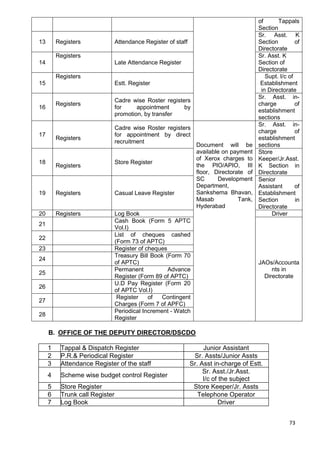

![75
CHAPTER – 7
PARTICULARS OF ANY ARRANGEMENT THAT EXISTS FOR
CONSULTATION WITH OR REPRESENTATION BY THE MEMBERS OF
PUBLIC IN RELATION TO THE FORMULATION OF ITS POLICY OR
IMPLEMENTATION THEREOF
[Section 4(1) (b) (7)]
Dr. Babu Jagjeevan Ram and Dr.B.R.Ambedkar Jayanthi Celebrations will be held
yearly on 5th April and 14th April respectively in State Headquarter and also in Districts. In
this celebrations SC individuals / Public and organizations will participate and their views
and suggestions will be taken into consideration.
In every District the public will submit the representations if any in Grievance
redressal cell to the Collector on every Monday. All Department Heads shall attend and
the instructions will be received from the collector for redressing the Grievances.
a) District Vigilance and Monitoring Committee
(G.O.Ms.No.232, SW (H) Dept., dated 26-11-1991)
1) District Magistrate (Collector of District) : Chairman
2) Superintendent of Police : Member
3) District Officers
a) Addl. District Magistrate : Member Secretary
b) Dy. Director (SCDD) : Convener
c) Executive Director, Dist.SC Coop., Society : Member
d) Project Officer, ITDA/DTWO : Member
4) Five Members of the Public to be nominated by State Govt. (Majority from
SCs & STs).
The Committee will see the cases of the atrocities against SCs & STs are pursued
vigorously and brought up before the Court. The Committee also supervises the
investigation of the cases of atrocity. It also has the authority to recommend proceeding
against public servant for willful neglect of his duties as prescribed under the SCs & STs
(POA) Act, 1989.](https://image.slidesharecdn.com/scdd-rtimanual-221009060943-51d350de/85/SCDD-RTIManual-pdf-75-320.jpg)

![77
CHAPTER – 8
A STATEMENT OF BOARDS, COUNCIL, COMMITTEES AND OTHER
BODIES CONSTITUTED AS ITS PART
[Section 4(1) (b) (8)]
8.1. Please provide information on Boards, Councils, Committees and Other Bodies
related to the public authority in the following format:
The SC Development Department has the following committees for better
administration and implementation of various schemes and statutory functions at state
level, District level and Sub Division level.
1. Prevention of Atrocities on SC&STs
2. Rule of Reservation
3. The welfare of the Jogins
4. The Welfare of the families engaged in Unclean Occupations
5. Bonded Labour
6. SCSDF
1) PREVENTION OF ATROCITIES ON SC&STs
a) State level Vigilance & Monitoring Committee:
(G.O.Ms.No.13, SW (POA) Department Dt.17.04.2006)
1 Chief Minister Chairman
2 Minister for Home Member
3 Minister for Finance Member
4 Minister for Social Welfare Member
5 Minister for Tribal Welfare
6 Members of Parliament (3 members)
7 Members of Legislative Assembly (10 SC and 2 ST
Members
Official Members
8 Chief Secretary Member
9 Director General of Police Member
10 Principal Secretariat Department Member
11 Principal Secretary, Home Department Member
12 Director/Deputy Director, National Commission
for SCs and STs
Member
13 Principal Secretary SW Department Member](https://image.slidesharecdn.com/scdd-rtimanual-221009060943-51d350de/85/SCDD-RTIManual-pdf-77-320.jpg)



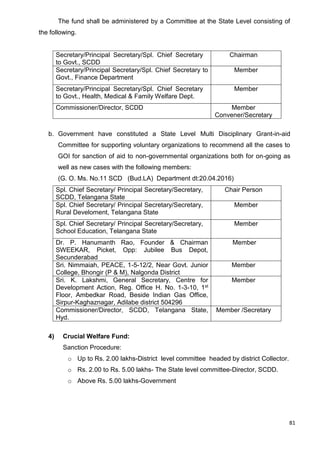



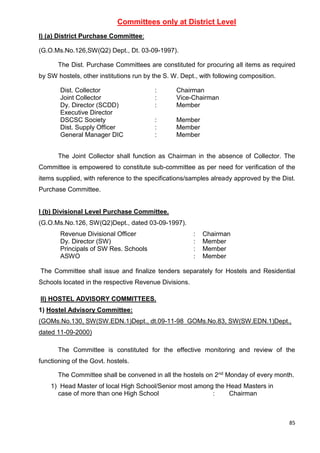


![88
CHAPTER – 9
Directory of Officers and Employees
[Section 4(1) (b) (9)]
DIRECTORATE OF SC DEVELOPMENT DEPARTMENT
(Updated on 08-05-2018)
Sl.
No
Name of the
Employee
Smt. & Sri
Designat
ion
Ph.No Email Address
Office Mobile Fax
1 P. Karunakar
Director
(FAC)
040-
23391362
9100333366
040-
23391039
commr_sw@telangana.gov.in
Directorate
of
Scheduled
Castes
Developme
nt
Departmen
t,3rd Floor,
DSS
Bhavan,
Masab
Tank,
Hyderabad
2 D. Uma Devi
Joint
Director
-DO- 8008885795 DO
3
K.Achutanand
Gupta
Deputy
Director
-DO- 8978486788 DO
4 B. Srinivas Reddy
Deputy
Director
-DO- 7331120942 DO
5 D. Vijayamma
Assistant
Director
-DO- 9100979975 DO
6
P.V. Sravan
Kumar Supdt
-DO- 9100979978 DO
7 S. Subbalaxmi Supdt -DO- 9100979982 DO
8 P. Srinivas Rao Supdt -DO- 9100979980 DO
9 M. Jayapal Reddy Supdt -DO- 7093322614 DO
10 Md. Aleem Uddin Supdt -DO- 9100979976 D
O
11 P.Venkataramana Supdt -DO- 8790886788 DO
12
Christopher
Augistine Supdt -DO- -
DO Directorate
of](https://image.slidesharecdn.com/scdd-rtimanual-221009060943-51d350de/85/SCDD-RTIManual-pdf-88-320.jpg)


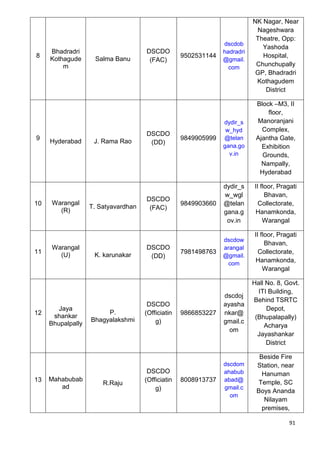



![95
The Monthly Remuneration Received By Each of its Officers and
Employees, Including the System of Compensation as Provided in
Regulations
[Section 4(1) (b) (10)]
SALARIES OF THE EMPLOYEES FOR THE MONTH OF MARCH-2018
O/o DIRECTOR OF S C DEVELOPMENT DEPARTMENT, TS, HYD
Sl.
No
Name
Employee
id
Designation Scale of pay Basic pay
Monthly
remunerati
on
(gross)
Net pay
1
Pidamarthy
Ravi
As per
G.O.Ms.No.
52,
scdd(scp)
dt.03.12.201
6
Chairman, SC
Corporation
- 100000 150000 149800
2 P.Karunakar 2573547
Additional
Director
66330-108330 110850 161929 137189
3 D.Umadevi 2577651 Joint Director 52590-103290 105810 153424 86084
4
Acyuthanan
dagupta
2005217 Deputy Director 49870-100770 61450 96427 85087
5
B.Srinivas
reddy
2549018 Deputy Director 49870-100770 59890 93943 81103
6
D.Vijayamm
a
2547738
Assistant
Director
37100-91450 66330 103917 82577
7
P.Kameswar
i devi
2532943 JAO 28940-78910 30580 48155 44080
8 P.J Swapna 2567011 JAO 28940-78910 30580 48155 41080
9 D.Sujatha 1400894
Publicity
Assistant
31460-84970 55410 86959 64679
10 D.Soloman 2549191 Supdt. 31460-84970 56870 89394 77114
11
V.N.bharadw
aj
1904132 D.S.O 28940-78910 48600 76425 70545
12
P.V.Sravan
kumar
2547718 Supdt. 28940-78910 44870 70706 52393
13 P.V.Ramana 2547756 Supdt. 28940-78910 58330 91539 69381
14
Md.Aleemud
din
2547778 Supdt. 28940-78910 52590 82613 63943
15
S.Subbalaks
hmi
2547801 Supdt. 28940-78910 40270 63508 46522
16
M.Jayapal
reddy
2547803 Supdt. 28940-78910 48600 76505 66626
17
E.Ratnakar
rao
2547743 Sr.Asst. 23100-67990 32340 50927 41773
18 Saritha 1725017 Sr.Asst. 22460-66330 32340 50897 41533
19 Md. Arif 2547732 Sr.Asst. 22460-66330 33220 52283 37742
20 P. Yadiraj 2547755 Sr.Asst. 22460-66330 33220 52283 37377
21
P. Srinivas
Rao
2549190 Supdt. 28940-78910 42490 66979 51327
22 N. Sanjeeva 1903897 Jr.Asst 21230-63010 34170 53747 39997
23
B. Gopala
Krishna
1937834 Sr.Asst. 21230-63010 46060 72510 60260
24 K. Balaiah 2547781 Driver 18400-55410 42490 67484 47055
25 J. Alwal 2547724 Driver 17890-53950 35120 57781 47039
26
P.
Nageswara
Rao
2547775 Record asst. 17890-53950 42490 66984 53118](https://image.slidesharecdn.com/scdd-rtimanual-221009060943-51d350de/85/SCDD-RTIManual-pdf-95-320.jpg)

![97
The Budget Allocations (Particulars of Plans, Proposed
expenditures and reports on disbursement made)
[Section 4(1) (b) (11)]
BUDGET - SCHEME WISE
Status of SCSDF Schemes Implementation and Expenditure in SC Development
Department for the year 2017-18 ( As on 31.03.2018) and B.E. 2018-19
Rs. In Lakhs
Sl.
No Scheme Details
Head of
Account
BE
Schemes
(Pragathi
Paddu)
(2017-18)
BRO
(2017-
18)
Expenditu
re
(2017-18)
BE
Schemes
(Pragathi
paddu)
2018-19
1 Head Quarters office
2225-01-
001-25-
SH(01)
601.00 450.75 437.25
601.00
2 District Offices
2225-01-
001-25-
SH(03)
500.00 375.00 100.56
500.00
3
Govt. hostels/ Ananda
Nilayams ( Pre- Matric
)
2225-01-
277-25-
SH(07)
11665.98 8749.49 7455.75
11,665.98
4
Special criminal courts
under PCR& POA ACT
2225-01-
800-25-
SH(05)
151.06 113.30 15.64
165.32
5
Assistance to TS study
circle
2225-80-
800-25-
SH(27)
1200.00 900.00 900.00
1600.00
6 TS SCST Commission
2225-01-
800-25-
SH(07)
61.48 46.11 18.00
191.10
7
Contribution to Social
welfare fund
2235-60-
200-25-
SH(07)
109.28 81.96 81.96
109.28
8
Assistance to Nodal
Agency for implementing
SC Sub plan
2225-01-
001-25-
SH(04)
300.00 225.00 137.94
400.00
9
Educational
Development
Infrastructure
(Construction of Hostel
Buildings, Study
Circles, VM Homes)
4225- 01-
277-25-
SH(74)
10000.00 0.00 1732.05
10,000.00
10
Social Development
Infrastructure
(Construction of
Community Halls
Ambedkar Bhavans,
Erections of Statues)
4225- 01-
800-25-
SH(07)
13000.00 0.00 355.89
18,000.00
11
Scholarships (Post)
/MTF
2225-01-
277-25-
SH(04)
19000.00 20149.00 12358.85
19085.35
12 Scholarships Post /RTF 2225-01- 49000.00 49000.00 24723.23 44,800.00](https://image.slidesharecdn.com/scdd-rtimanual-221009060943-51d350de/85/SCDD-RTIManual-pdf-97-320.jpg)
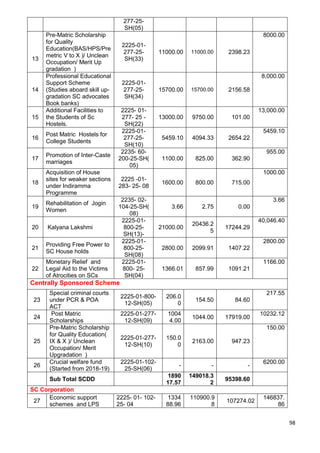



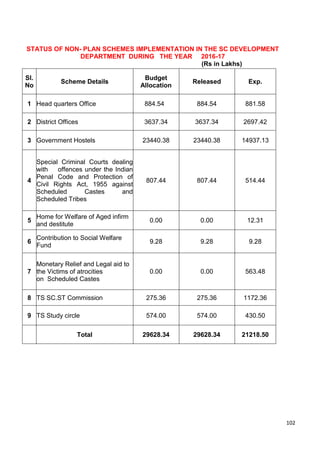










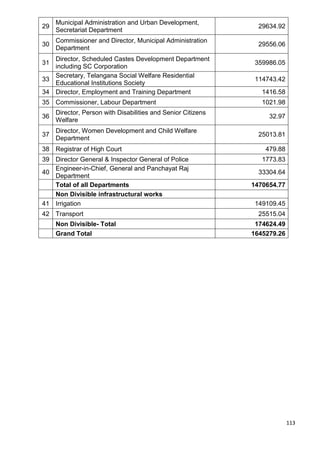
![114
CHAPTER – 12
The Manner of Execution of Subsidy Programmes
[Section 4(1) (b) (12)]
Scheme wise Guidelines
Educational Support Schemes
a) POST METRIC SCHOLARSHIPS:
1 Name of the Scheme Post-Matric Scholarships RTF & MTF
2 Head of Account
2225-01-277-25-05-340 (RTF)
/2225-01-277-25-04-340 (MTF)
3 Description of the Scheme
For all eligible SC students who are pursuing their higher
studies in approved colleges & courses, Govt., sanctions
the Re-imbursement of Fee to the colleges and
maintenance charges to students.
4 Eligibility criteria should have passed X class / equivalent exams
5 Who is eligible
(i) All eligible SC students native of TG
(ii) Should cover within age limit prescribed
(iii) Only one degree /course at one stage.
6 Income Limit
Income ceiling is Rs.2.00 lakh from all sources of the
family.
7
Amount eligible / benefit
amount
All Non-refundable fees as fixed by the Govt., from time to
time for the courses reimbursed to eligible SC students.
8 Any reservation applicable No
9 If yes, prescribe % Does not arise
10 Where to get application form Students should register their application in online.
11 How to apply for the scheme With required documents prescribed
12 Online / Manual Online
13 If online web portal / address https://telanganaepass.cgg.gov.in
14 To whom to apply Director, SC Development Department
15 Where to apply Online
16 Sanctioning Authority Concerned District SC Development Officer
17 Scrutiny / check slip
1) Bonafide certificate of previous year study
(2) Income & Caste certificates from Mee-seva
(3) CET Allotment orders for Professional courses
(4) Copy of Bank Pass Book showing account Number
(5) Aadhaar Number
(6) Educational qualification certificates
18
Procedure for sanction
including web navigation
1) Student will apply in online with all required documents
for Fresh / Renewal.
(2) The fresh students Aadhar & Bank A/c will be verified
and confirmed by DSCDO
(3) The college authorities forward the confirmed renewal
applications by observing the factors
(a) 75% attendance
(b) Pass/promoted of previous year study
(c) Continuation of the course
(d) In respect of fresh applications - CET allotment orders,](https://image.slidesharecdn.com/scdd-rtimanual-221009060943-51d350de/85/SCDD-RTIManual-pdf-114-320.jpg)






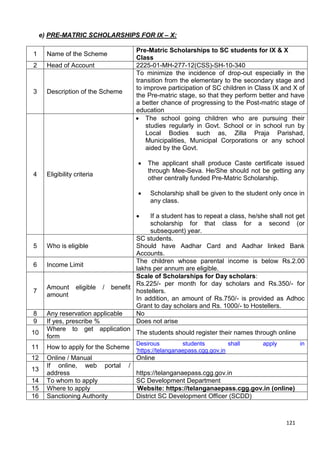



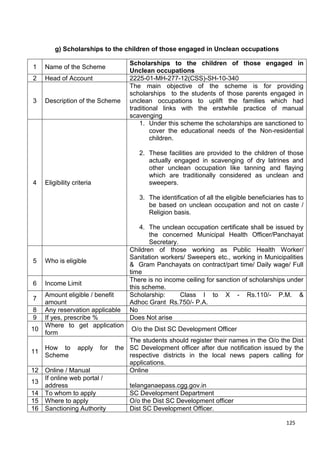



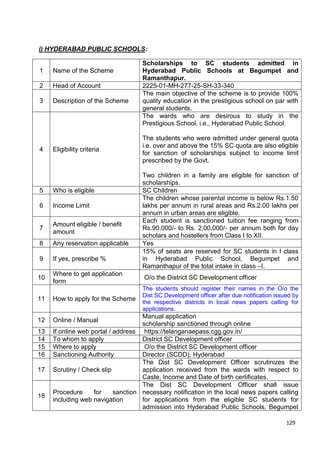








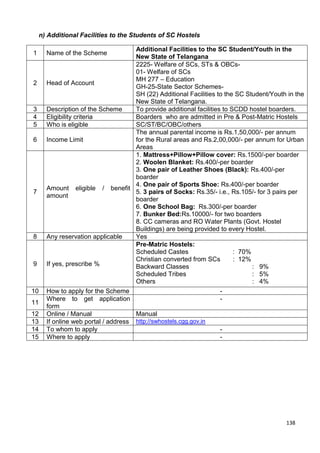





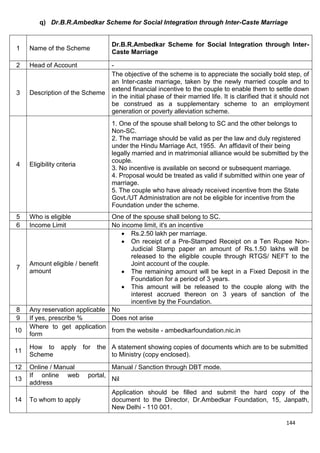


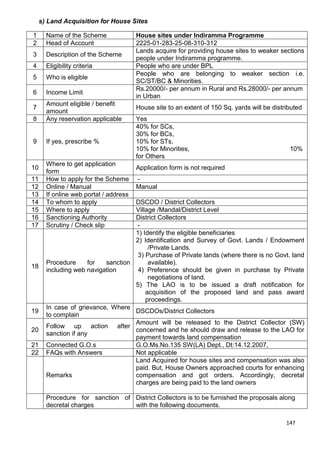

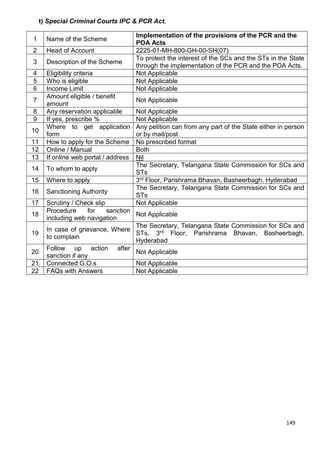





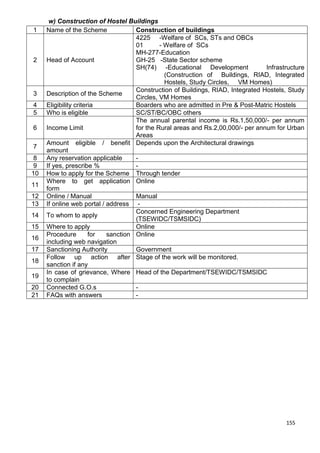




![160
CHAPTER-13
Particulars of Recipients of Concessions, permits or
Authorization granted by it
[4(1) (b) (13)]
This Department Sanctions Scholarships for students of Pre- Metric Institutions i.e.
up to 10th standard and Post Matric Institutions i.e. from Intermediate and above the
details as fallows.
I-PREMETRIC SCHOLORSHIPS
A) Pre matric scholarship (New scheme)
B) Rajiv Vidya Deevena
C) Pre matric Scholarship for the children of families engaged in unclean occupations
D) Best Available schools
E) Hyderabad Public Schools
II-POST - METRIC SCHOLORSHIPS
A) Reimbursement of Tuition Fee(RTF)
B) Payment of Mess Charges (MTF)
C) Admission in Corporate Colleges
D) Ambedkar Overseas Vidya Nidhi (Grant for Abroad studies)
E) Skill Up-gradation Coaching for the students for GRE, GMAT, TOEFL, IELTS
and etc.
F) Out of State Scholarships (Payment of tuition fee and Mess Charges for the
Students of Prestigious institutions such as IITs, NITs, BIITs, AIIMS and AFMC
etc.)
The Scheme Details as well as the students benefited under the schemes can be
seen in the Department Website i.e.,
1. https://telanganaepass.cgg.gov.in
2 .https://tsswhostels.cgg.gov.in](https://image.slidesharecdn.com/scdd-rtimanual-221009060943-51d350de/85/SCDD-RTIManual-pdf-160-320.jpg)
![161
CHAPTER – 14
Information available in an Electronic Format
[Section 4(1)(b) (14)]
This Department Sanctions Scholarships for students of Pre- Metric Institutions i.e.
up to 10th standard and Post Metric Institutions i.e. from Intermediate and above the
details as fallows.
I. PREMETRIC SCHOLORSHIPS
A) Pre matric scholarship (New scheme)
B) Rajiv Vidya Diveena
C) Pre matric Scholarship for the children of families engaged in unclean occupations
D) Best Available schools
E) Hyderabad Public Schools
(www.telanganaepass.cgg.gov.in)
II. POST - METRIC SCHOLORSHIPS
A) Reimbursement of Tuition Fee (RTF)
B) Payment of Mess Charges (MTF)
C) Admission in Corporate Colleges
D) Ambedkar Overseas Vidya Nidhi (Grant for Abroad studies )
E) Skill Up gradation coaching for the students for GRE, GMAT, TOEFL, IELTS, etc.
F)Out of State Scholarships(Payment of tuition fee and Mess Charges for the
Students of Prestigious institutions such as IITs, NITs, BIITs, AIIMS, AFMC etc.)
(www.telanganaepass.cgg.gov.in)
III. HOSTELS
The total boarders admitted (Registered) in Pre-Metric hostels as well as Post Metric
Hostels is available in the internet at https://tsswhostels.cgg.gov.in
IV. OTHER SCHEMES
A) Progress of Kalyana Lakshmi applications in Sanctions.
The Scheme Details as well as the students benefited under the schemes can be
seen in the Department Website i.e. www.telanganaepass.cgg.gov.in](https://image.slidesharecdn.com/scdd-rtimanual-221009060943-51d350de/85/SCDD-RTIManual-pdf-161-320.jpg)
![162
CHAPTER – 15
Particulars of the facilities available to citizens for obtaining
information
[Section 4(1) (b) (15)]
a. The information is available in the Library 4th floor, DSS Bhavan, Masab Tank,
Hyderabad from 10.30 A.M to 5.00 P.M (in working days).
b. The Information is available in Websites.
c. The Important information with due dates for submission of applications as well
as new schemes introduced is affixed on the notice board 3rd floor, DSS
Bhavan, Masab Tank, Hyderabad.
d. Inspection of Records is permitted on submission of application form and with
the permission of Head of the Office i.e. Addl. Director, Director of SC
Development Department.
e. System of issuing of copies of Documents is available at Asst. Public
Information Officer.
f. Printed Manuals on the schemes implemented as well as the rules and
guidelines for regulation of activities are available in the Library which can be
referred by the permission of Librarian.
g. Website of the Public Authority www.telanganaepass.cgg.gov.in.
h. The E-Mail of Public Authority is commr_sw@telangana.gov.in.
i. Brochures and Pamphlets are available at the reception 3rd floor, DSS Bhavan,
Masab Tank.](https://image.slidesharecdn.com/scdd-rtimanual-221009060943-51d350de/85/SCDD-RTIManual-pdf-162-320.jpg)
![163
CHAPTER – 16
The Names, designations and other particulars of the Public
Information Officers
[Section 4(1) (b) (16)]
Name of the Public Authority: Directorate of SC Development Department.
(I) ASSISTANT PUBLIC INFORMATION OFFICERS (APIO):
a) Head Office (State Office)
Sl.
No
.
Name Designation
STD
Cod
e
Ph. No.
Office Mobile
Fax Email
1
K. Achutanand
Gupta
Deputy
Director
040 23391362 8978486788 040-23392001
commr_telan
gana.gov.in
b) District Offices
Sl.
No
.
Name Designation
STD
Code
Ph.No.
Office Mobile
Email Address
1 Archana Rathod
Sr. Asst., O/o the
DSCDO, Adilabad
08732 226230 9491163011 dscdoabd@gmail.
com
O/o DSCDO,
Adilabad
2 M. Nagamallishwar
Superintendent,
O/o SCDD
Mancherial
08736 252222 9704011827 dscdomncl2016@
gmail.com
Near Sai
baba Temple,
jaffar Nagar,
Mancherial
District
3 N. Murali Krishna
Sr. Asst., O/o
DSCDO, Nirmal
08734 244344 dscdonirmal@gma
il.com
Opp: IB Guest
House,
Samudrala
Venugopal
Complex, 2nd
floor, Nirmal
4 Satyajeeth Mandal Sr. Asst., O/o the
DSCDO,
Komarambheem
Asifabad
7989561828 dscdokomuram@g
mai.com
O/o DSCDO,
Komuram
Bheem
Asifabad
5 T. Madhavi Sr. Asst., O/o the
DSCDO,
Nizamabad
- - 9848763565
6 Sudarshan Gupta
Sr. Asst., O/o the
DSCDO, Kama
Reddy
dscdokamareddy
@gmail.com
O/o the
DSCDO,
Pragathi
Bhavan,
Collectorate,
Kamareddy](https://image.slidesharecdn.com/scdd-rtimanual-221009060943-51d350de/85/SCDD-RTIManual-pdf-163-320.jpg)








![172
CHAPTER-17
Other Useful Information
[Section 4(1) (b) (17)]
FAQS Of Category: Post Matric Scholarship
Question1: What is a post matric Scholarship (PMS)?
Answer: A post matric scholarship is the scholarship which is granted to
students by the welfare departments of the Govt. for enabling
eligible students who have passed tenth class (SSC examination
or equivalent to pursue post matric studies such as intermediate,
ITI, polytechnic, professional courses, graduate and post graduate
courses, Ph. D etc.
Question2: What are the components of a PMS?
Answer: A post matric scholarship has two components namely
reimbursement of tuition fee (RTF) to the college and
maintenance fee to the student (MTF).
Question3: How much reimbursement will I get?
Answer: The reimbursement of tuition will be dependent on the course you
pursue. While most of the courses are eligible for 100% of the
tuition fee as fixed by the government. Self financed courses are
eligible only for a maximum of Rs. 20,000 or the actual fee
charged by the college, whichever is less.
Question4: Will I get a scholarship automatically on application?
Answer: Scholarships are granted only after admission to a college and is
subject to verification and eligibility. Only those who are eligible
will be granted a scholarship. The steps for a scholarship are
given as under:
1. Secure admission to a college
2. Apply online for a scholarship through the concerned
welfare department i.e., (SC/ST/BC/EBC/DW/MW)
3. Verification by the college principal
4. Verification by the Verification officer
5. Scrutiny by the Welfare Officer
6. Sanction of the scholarship
7. Submission of the bill online to the treasury
8. Sanction of the bill and upload of amounts into student
(MTF)and college (RTF) bank accounts
Question5: How can I know my scholarship status?](https://image.slidesharecdn.com/scdd-rtimanual-221009060943-51d350de/85/SCDD-RTIManual-pdf-172-320.jpg)

